How to Rank for ‘Near Me’ Keywords on Google
October 4, 2024 • 24 min read

Learn everything you need to know about what they are and how to rank for ‘near me’ keywords on Google.
You’ve probably seen ‘near me’ queries show up when doing keyword research, when checking a site’s rankings in Semrush or Ahrefs or showing in your site’s Search Console’s performance report.
But do you really understand the intent behind these types of keywords, how to rank for them and if you should even be targeting them at all?
In this guide, I’ll walk you through a proven process that you can use to rank for these queries, as well as teach you the fundamentals of how these results are returned.
Ready? Let’s go…
Understanding ‘Near Me’ Keywords
To understand how to optimise for ‘near me’ keywords, you first need to understand a searcher’s intent when they search these queries.
Let’s look at the SERPs for two example searches (made on mobile).
“plumber near me”
Of course, we also see a map pack showing for this search.
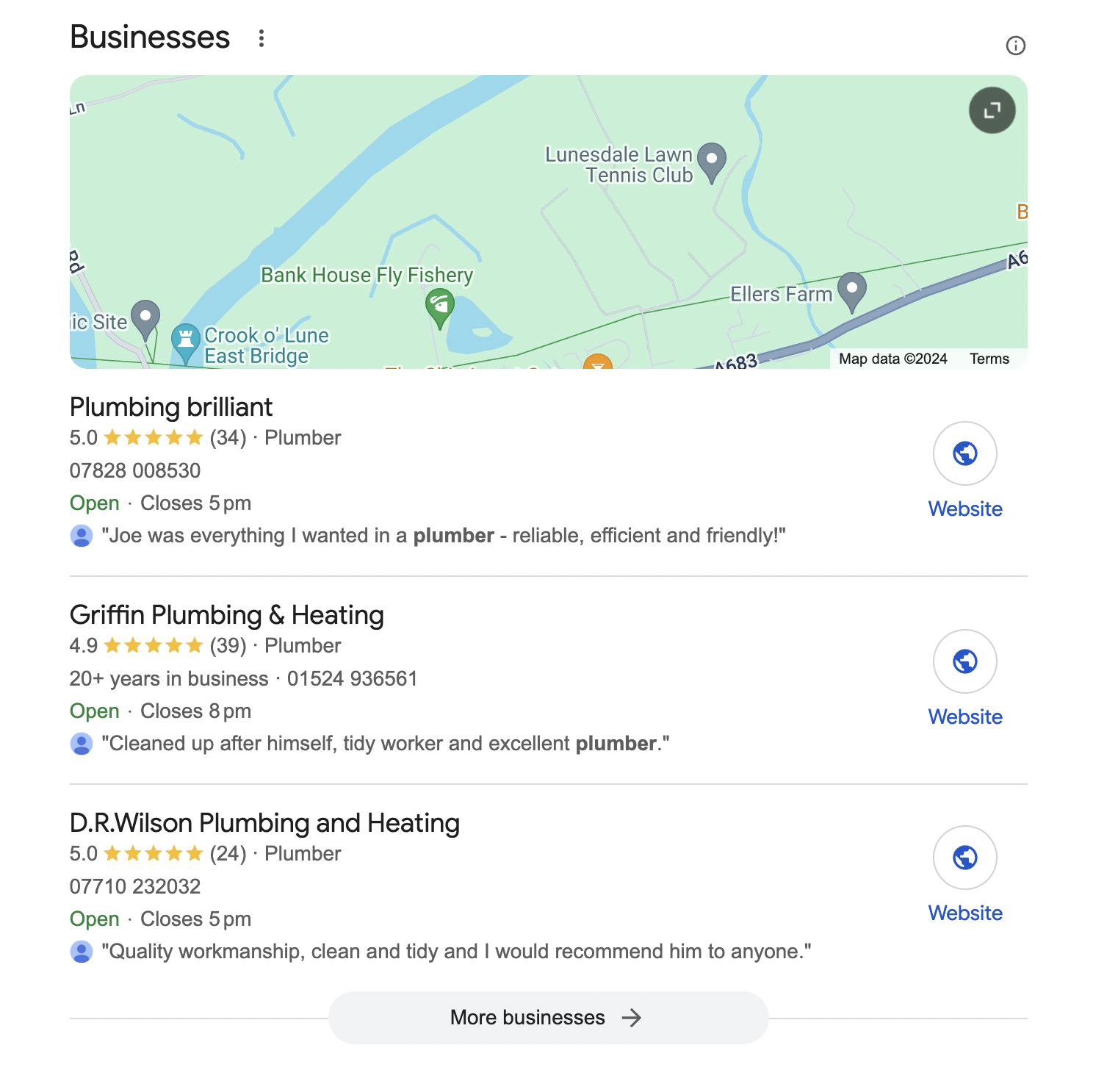
“things to do with kids near me”
We don’t see a map pack here, but we do see a ‘top sights’ feature.
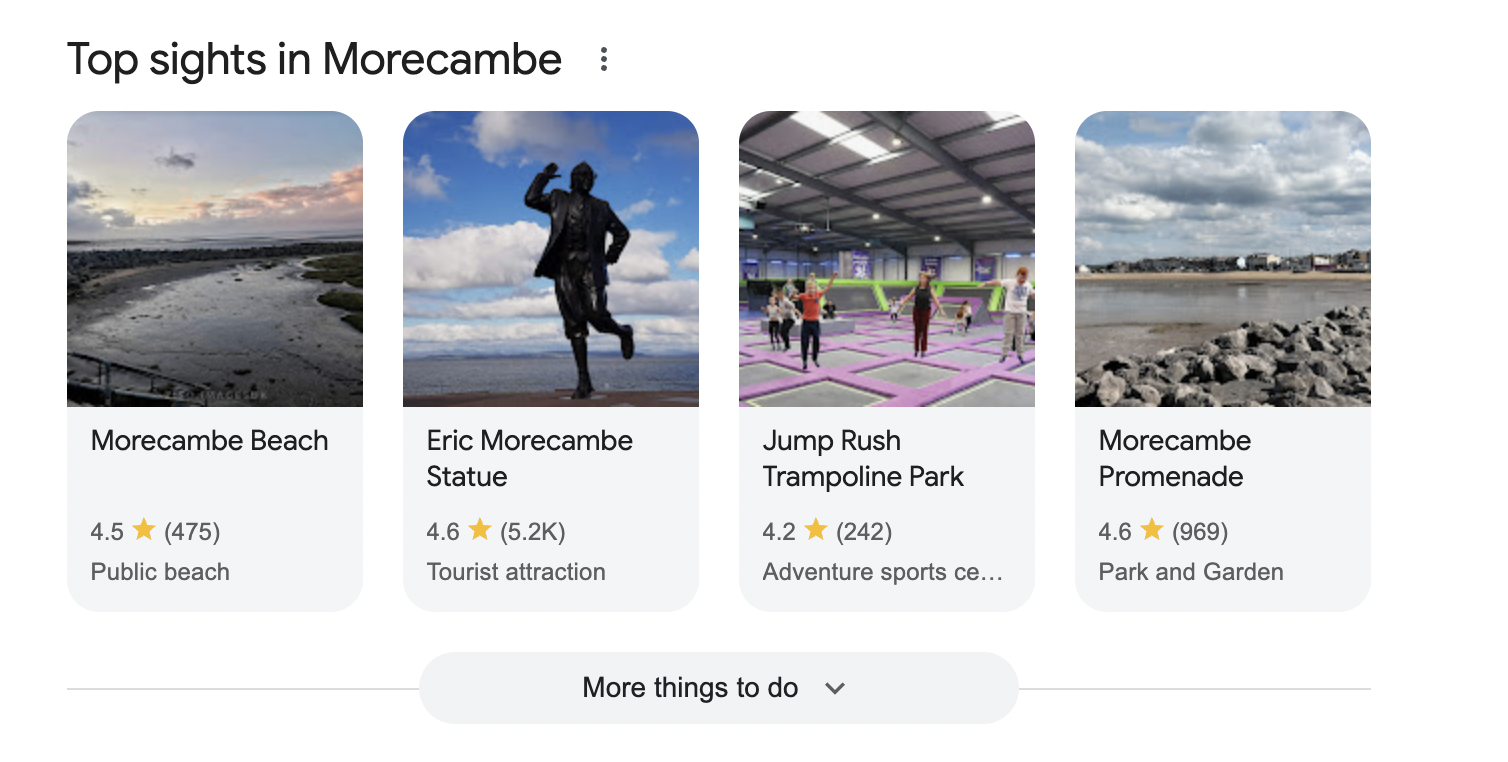
Notice how these results are mostly all localised to ‘Morecambe’? (That’s where I live, for context.)
I didn’t include a location modifier in my search, yet Google returned results local to where I’m searching from.
In other words, it understood where I wanted to see results relevant to and returned exactly this.
Someone searching a “near me” query wants to see results local to where they are at that moment in time. Someone in Manchester wants to see results for Manchester. Someone in Liverpool wants to see results for Liverpool. They want to find nearby businesses.
In fact, one of the best explanations of this can be taken from Pandu Nayak’s testimony in the DOJ vs Google trial.
Nayak was asked about results being served in part based on their locale:
“And if you’re searching for pizza, the word “pizza,” you want a pizza restaurant around the corner from you, not necessarily the best pizza place in the world?”
He responded:
“That’s right.”
There’s probably no simpler way to explain user intent and expectation for “near me” queries.
Get it?
But that doesn’t just mean Google is primarily ranking local businesses for this type of search. And this is one of the biggest takeaways I’ve got for you here… it’s often not local businesses that rank for ‘near me’ searches.
Keep reading to learn more, and how to tailor a ‘near me’ strategy to your business.
But first, let’s do a quick breakdown of the first page of the SERPs for these two queries and analyse them a bit more closely:
“plumber near me”
| Rank | URL | Result Type |
|---|---|---|
| 1 | https://www.checkatrade.com/blog/plumbers-near-me/ | National result |
| 2 | https://www.checkatrade.com/Search/Plumber/in/Morecambe | Localised result |
| 3 | https://www.yell.com/s/plumbers-morecambe.html | Localised result |
| 4 | https://www.ratedpeople.com/local-plumbers | National result |
| 5 | https://m.yelp.com/search?cflt=plumbing&find_loc=Torrisholme%2C+Morecambe%2C+Lancashire | Localised result |
| 6 | https://www.able-group.co.uk/plumbing/ | National result |
| 7 | https://www.mybuilder.com/plumbing/plumber-tradespeople/morecambe | Localised result |
| 8 | https://www.trustatrader.com/plumbers-in-Morecambe | Localised result |
| 9 | https://www.bark.com/en/gb/plumbers/ | National result |
| 10 | https://www.hamuch.com/plumber | National result |
“things to do with kids near me”
A search for “plumbers near me” by someone in Morecambe essentially has the same intent as a search for “plumbers in Morecambe.” Depending on the location and the size of the town or city, this could even end up being closer to a more granular location-based search. They’re not using a location modifier because they’re in that location when they search, and instead of using that, they search ‘near me.’
Searchers are savvy to the fact that Google has got pretty good at knowing where someone is searching from.
But that doesn’t necessarily mean that the results that Google returns for a search for ‘plumbers near me’ by someone in Morecambe are identical to those returned for ‘plumbers in Morecambe.’
They probably should be, but they’re not.
Here’s the top 10 for these two searches side-by-side:
The main thing that stands out to me here is that the ‘near me’ search is made up almost entirely of nationally-focussed sites that offer options for plumbers in the local area, with their ‘Morecambe’ page or a nationwide ‘enter your location’ page ranking. That’s with the exception of Able Group, which offers nationwide services.
What we don’t see for the ‘near me’ search is any local businesses. That being individual businesses that offer services in the local area.
We do, however, see two of these ranking for a ‘Plumbers in Morecambe’ search.
On both searches, local businesses take the map pack slots.
What we can agree on, though, is that both of these SERPs are relevant to the searcher’s query. Albeit the SERPs are still predominantly listing sites in both cases.
There’s no ignoring the fact that very few local businesses rank amongst the standard web results for ‘near me’ queries.
I ran a ‘near me’ search on mobile for five different queries, and only 5 local businesses rank in top 10 positions across all of these (out of 50 results):
- Wedding venues near me (0 local businesses)
- Electricians near me (1 local business)
- Pizza near me (2 local businesses)
- Restaurants near me (0 local businesses)
- Physiotherapist near me (2 local businesses)
Google just isn’t returning individual local businesses for the majority of ‘near me’ searches. Instead, it’s mostly either national businesses (with their local division ranking) or listing sites, where the searcher has the opportunity to find and compare multiple different businesses that match their search.
Why?
Because searchers want choice. If they’re looking for a wedding venue near to them, they want to land on a page where they can browse multiple options, all showing the same factors. They usually don’t want to visit the individual websites of multiple wedding venues and have to spend time browsing the sites to find the information they want.
Browsing everything in one place is faster and more efficient for the searcher.
Let’s revisit the ‘plumbers near me’ SERP I first looked at above, adding in the type of site that’s ranking.
| Rank | URL | Site Type |
|---|---|---|
| 1 | https://www.checkatrade.com/blog/plumbers-near-me/ | Listings – Search Page |
| 2 | https://www.checkatrade.com/Search/Plumber/in/Morecambe | Listings – Results Page |
| 3 | https://www.yell.com/s/plumbers-morecambe.html | Listings – Results Page |
| 4 | https://www.ratedpeople.com/local-plumbers | Listings – Search Page |
| 5 | https://m.yelp.com/search?cflt=plumbing&find_loc=Torrisholme%2C+Morecambe%2C+Lancashire | Listings – Results Page |
| 6 | https://www.able-group.co.uk/plumbing/ | National Business |
| 7 | https://www.mybuilder.com/plumbing/plumber-tradespeople/morecambe | Listings – Results Page |
| 8 | https://www.trustatrader.com/plumbers-in-Morecambe | Listings – Results Page |
| 9 | https://www.bark.com/en/gb/plumbers/ | Listings – Search Page |
| 10 | https://www.hamuch.com/plumber | Listings – Search Page |
Of these 10 results, 9 of these come from ‘listing’ sites. Call these comparison sites, directories, or whatever you want … they’re returning business listings.
And you can’t ignore how significant this is. Understanding whether your site can rank amongst the standard web results for ‘near me’ queries needs to be something you consider.
Unfortunately, a lot of businesses just aren’t going to be able to rank for these queries with either their homepage or a location page (unless they’re serving businesses nationally across multiple locations).
But that doesn’t mean you can’t leverage these results to drive traffic to your site and enquiries for your business. You just need to think about SEO as being more than just your own site’s page ranking.
Once you understand what users want to see, and therefore what Google wants to rank, when someone searches a “near me” query, it becomes a lot easier to figure out a strategy to rank for them.
Should You Try to Rank for ‘Near Me’ Keywords?
It’s easy to get caught out by ‘near me’ keywords when doing keyword research.
At least, it is when you’re too focused on search volume and don’t take the time to properly consider the intent behind a keyword and how relevant it actually is to your site.
Just look at the volumes for these ‘near me’ queries:
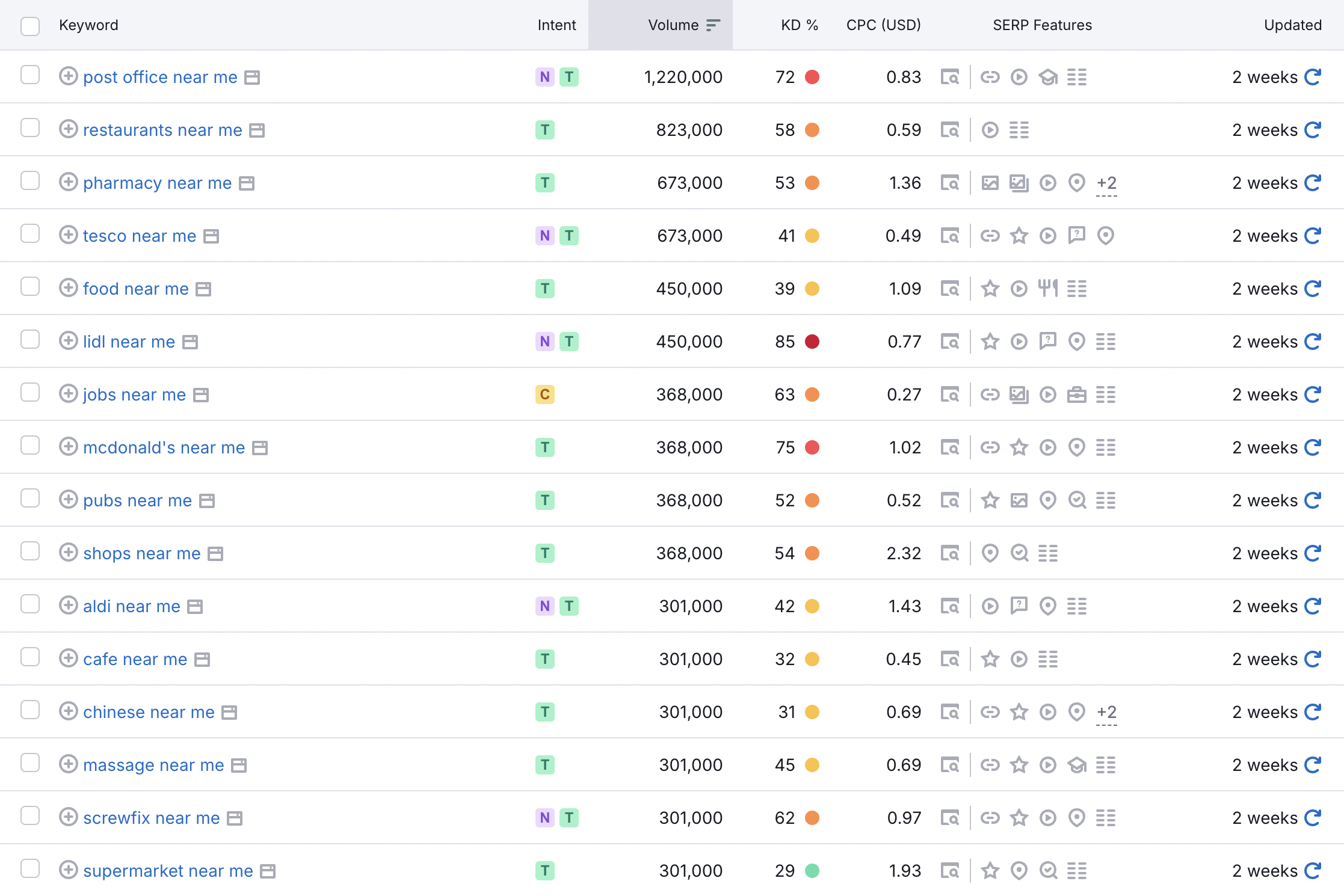
For some sites, they’re invaluable and open up a whole load of potential traffic when worked into a wider strategy. But for others, the likelihood of actually being able to rank amongst the standard SERP results is incredibly small.
But for those businesses where ‘near me’ queries make sense, there are ways to leverage these. Even when a business isn’t likely to rank itself.
To determine whether or not you should be optimising for “near me” queries, you need to stop and think about how your audience is searching.
Is your target audience searching for products or services in their local area?
If your audience searches for your products or services in their local area, it’s pretty much guaranteed they’re using ‘near me’ queries.
Think things like:
- Restaurants & cafes
- Takeaways & food delivery
- Gyms
- Tradespeople (plumbers, roofers, electricians etc)
- Mechanics & garages
- Health & beauty services (hairdressers, beauty salons, dentists, physios etc)
- Things to do
- Driving instructors
- Wedding venues
This is just a small selection of the types of businesses that people search locally for, but some of the more common ones.
They’re either businesses that customers travel to (within their local area) or ones that come to them at their homes.
You get the idea.
If your business has a physical presence (you’re dealing with customers or clients at your place or business or in their homes, mostly), there are likely going to be ‘near me’ searches happening. This means brick-and-mortar stores can gain traction here, too. Especially ones with multiple locations.
If you’ve identified that ‘[product or service] in [location]’ keywords are an important part of your strategy, ‘near me’ keywords will be too.
But there’s one more thing you need to consider to be able to define your strategy: the type of business you are. This has a significant impact on the tactics you’ll need to leverage to rank for these queries.
What type of business are you trying to rank?
Let’s assume you’ve identified that ‘near me’ searches are relevant and have the potential to drive targeted traffic and sales or enquiries.
The type of business and site you run is going to play a huge part in your approach. Opportunities exist for all of these to leverage ‘near me’ searches, but they’re wildly different.
Here are some examples; see which ones most closely match your business.
A Local Business
A local business typically has one main location and serves a small geographical area.
Think businesses like:
- Tradespeople
- Takeaways & food delivery
- Dentists & orthodontists
- Lawyers
- Cleaning services
- Vets, dog boarding, dog grooming & other pet services
- Automotive services
There are many, many more types of local business, but this should give you a good idea.
Here are three examples:
Amara Electrical, an electrician in Manchester

Fivelands, a vets in Birmingham
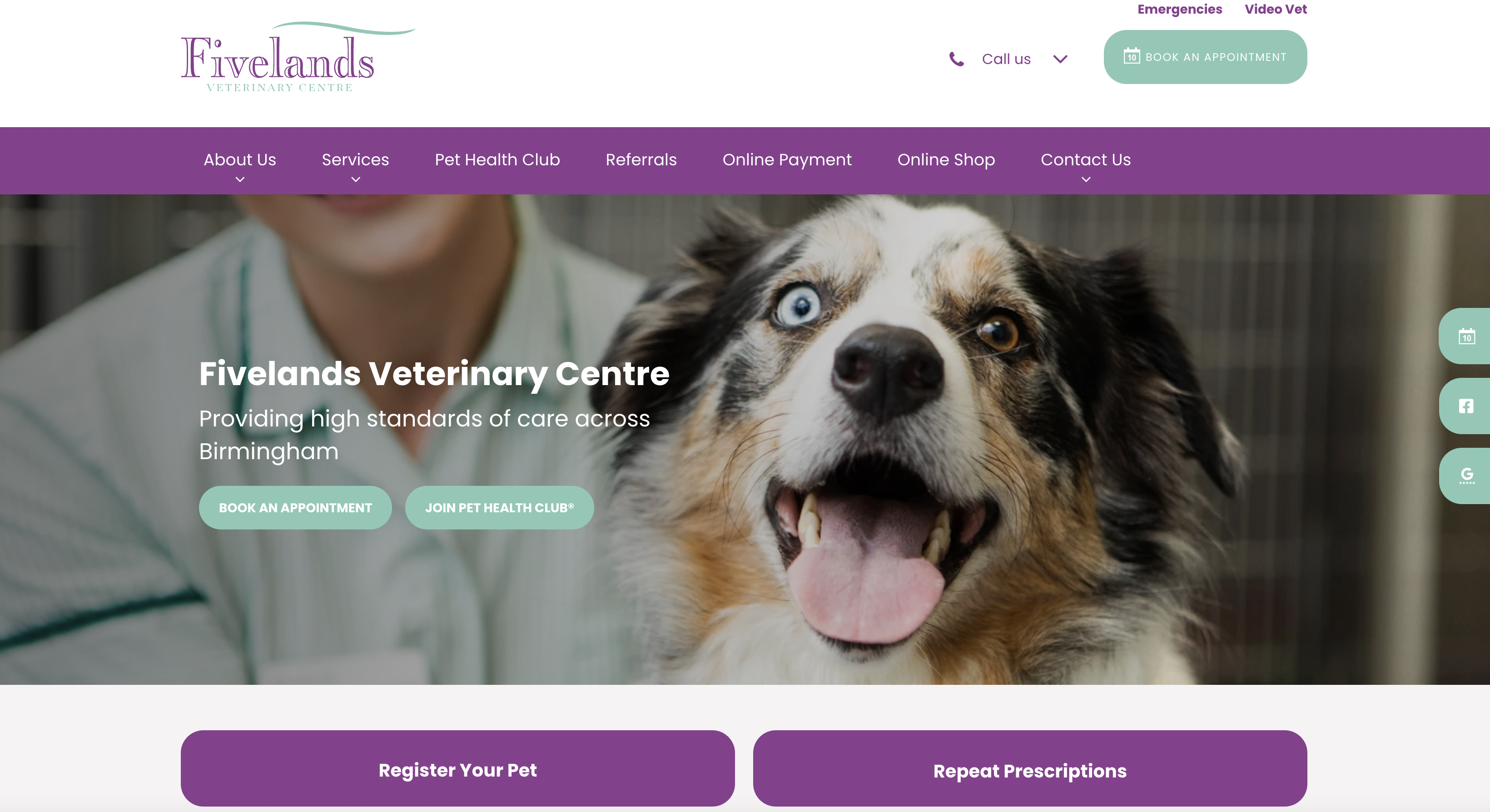
Bristol Dental Suite, dentists in Bristol
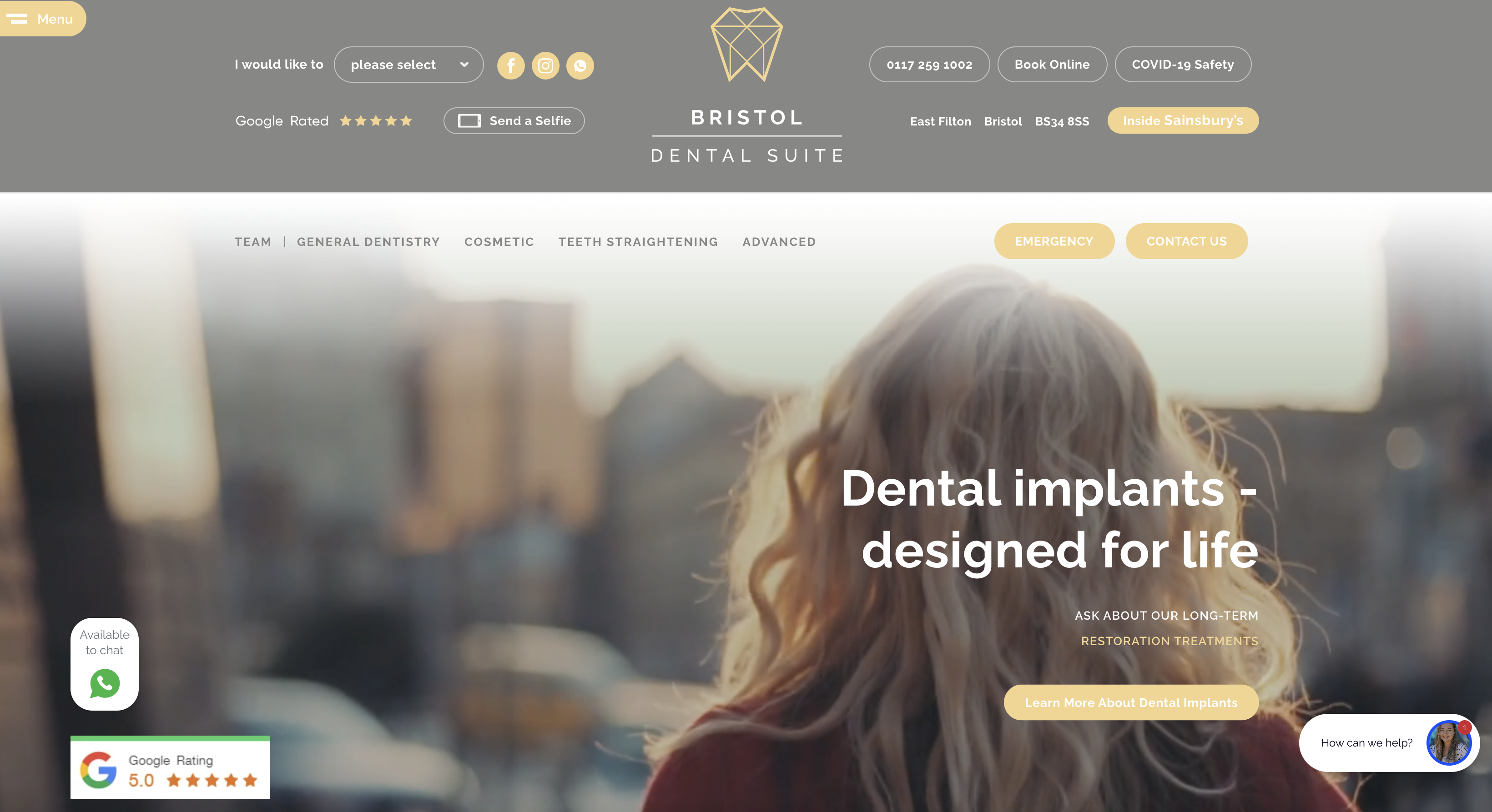
A Business That Serves Multiple Locations
A business that serves multiple locations can fall into one of two main groups:
- A business that has physical locations in multiple locations across the country (or world)
- A business that offers in-person services nationwide
Whilst these are technically very different types of businesses, the approach to ranking for ‘near me’ queries for them is the same.
Here are three examples:
BOXT, a nationwide boiler installation company
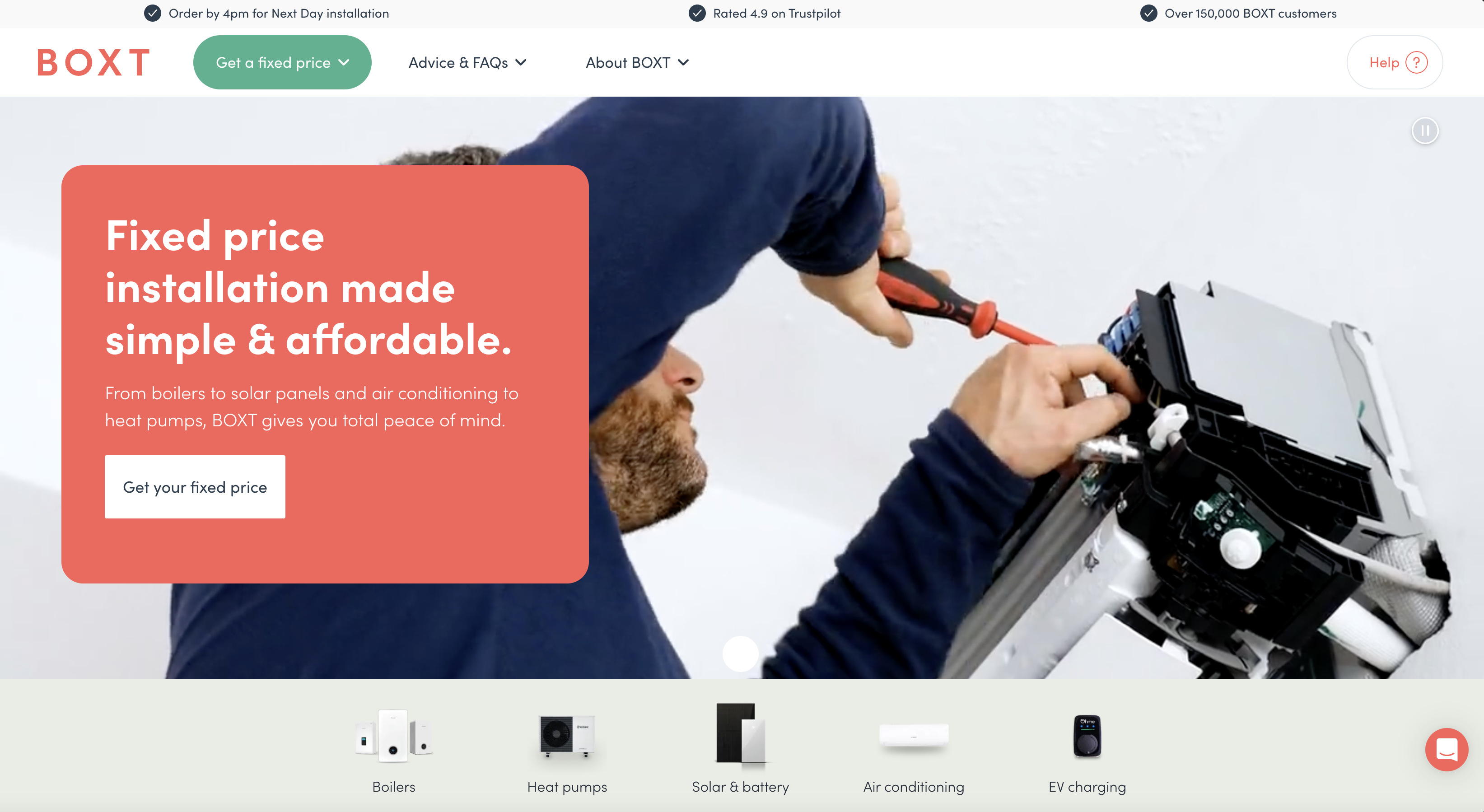
Anytime Fitness, an operator of 5,000+ gyms worldwide
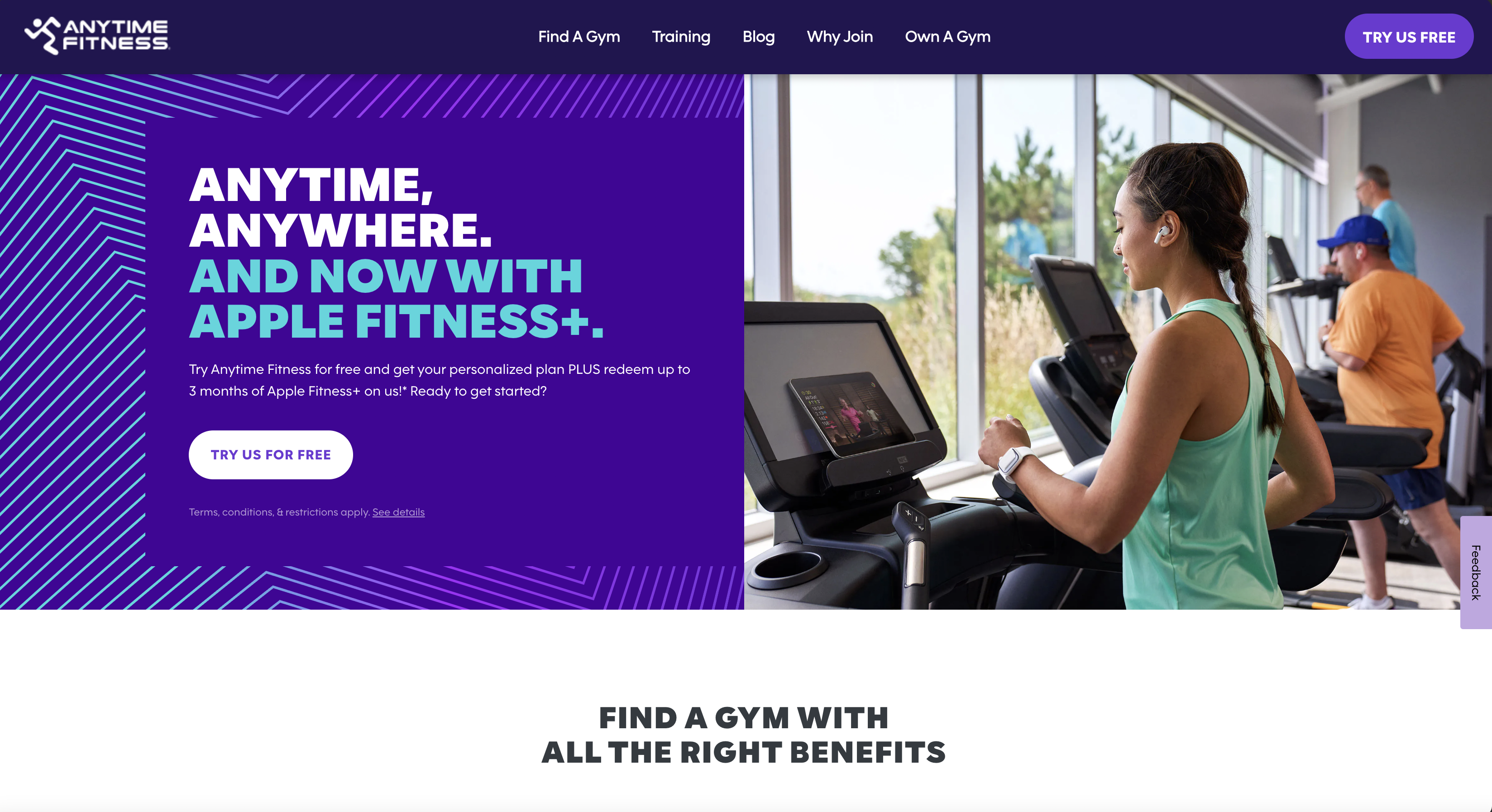
Vets for Pets, a nationwide chain of vets
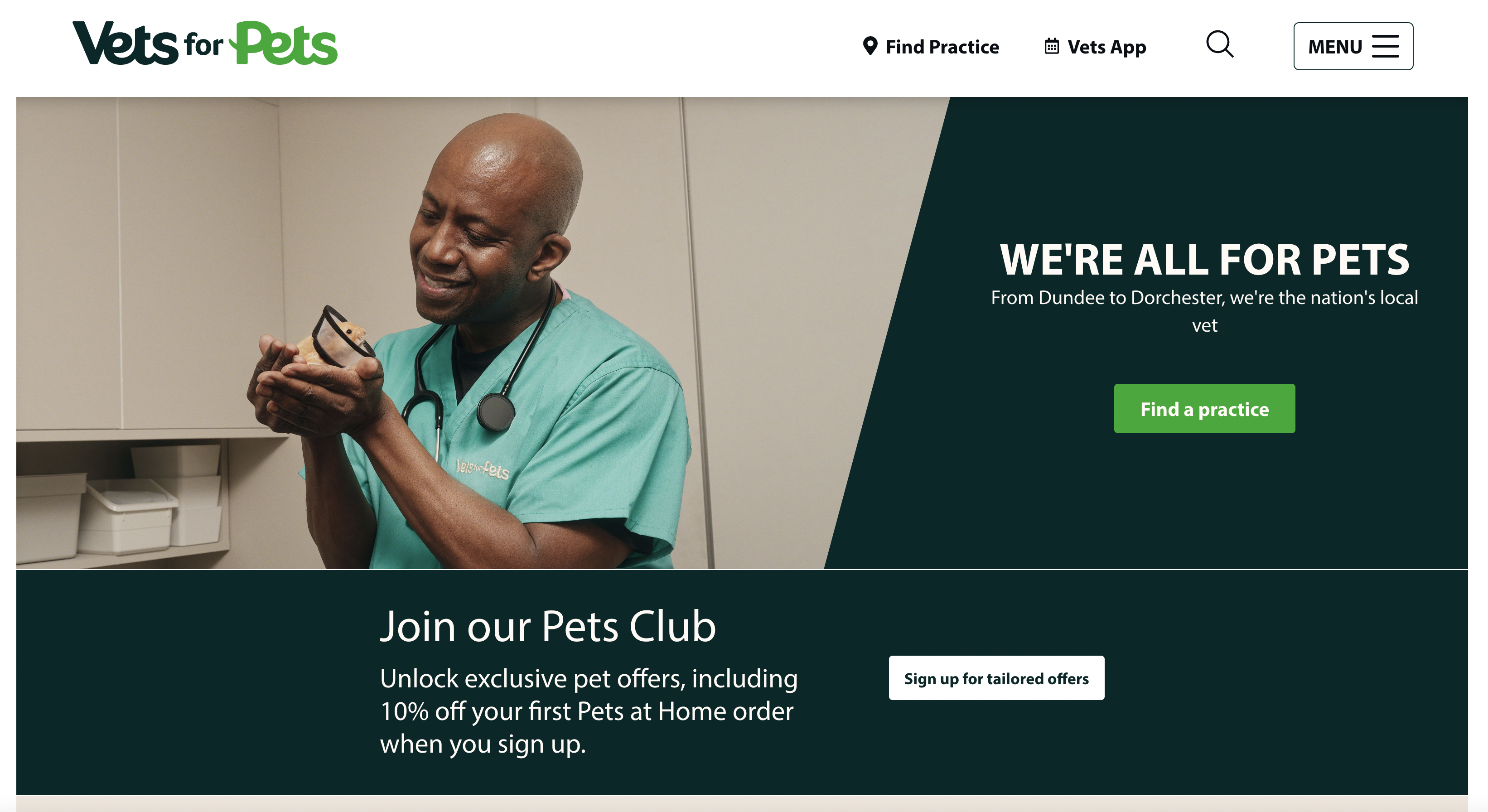
A Listings Site
Listings sites are a unique one in that they aren’t really your ‘traditional’ business; they’re usually online-only businesses.
But when looking at the SERPs for ‘near me’ searches, they’re being given huge prominence right now.
I don’t just want to refer to them as ‘directories’ because they’re not; they’re typically lead generation sites, often where a local business is signing up to be a member or to be listed.
If this is the type of business you operate, you’re probably already getting visibility for ‘near me’ searches, but this might not have been an intentional strategy, and there’s a very good chance you can double down on this.
Here are three examples:
Checkatrade, a platform that connects homeowners with tradespeople
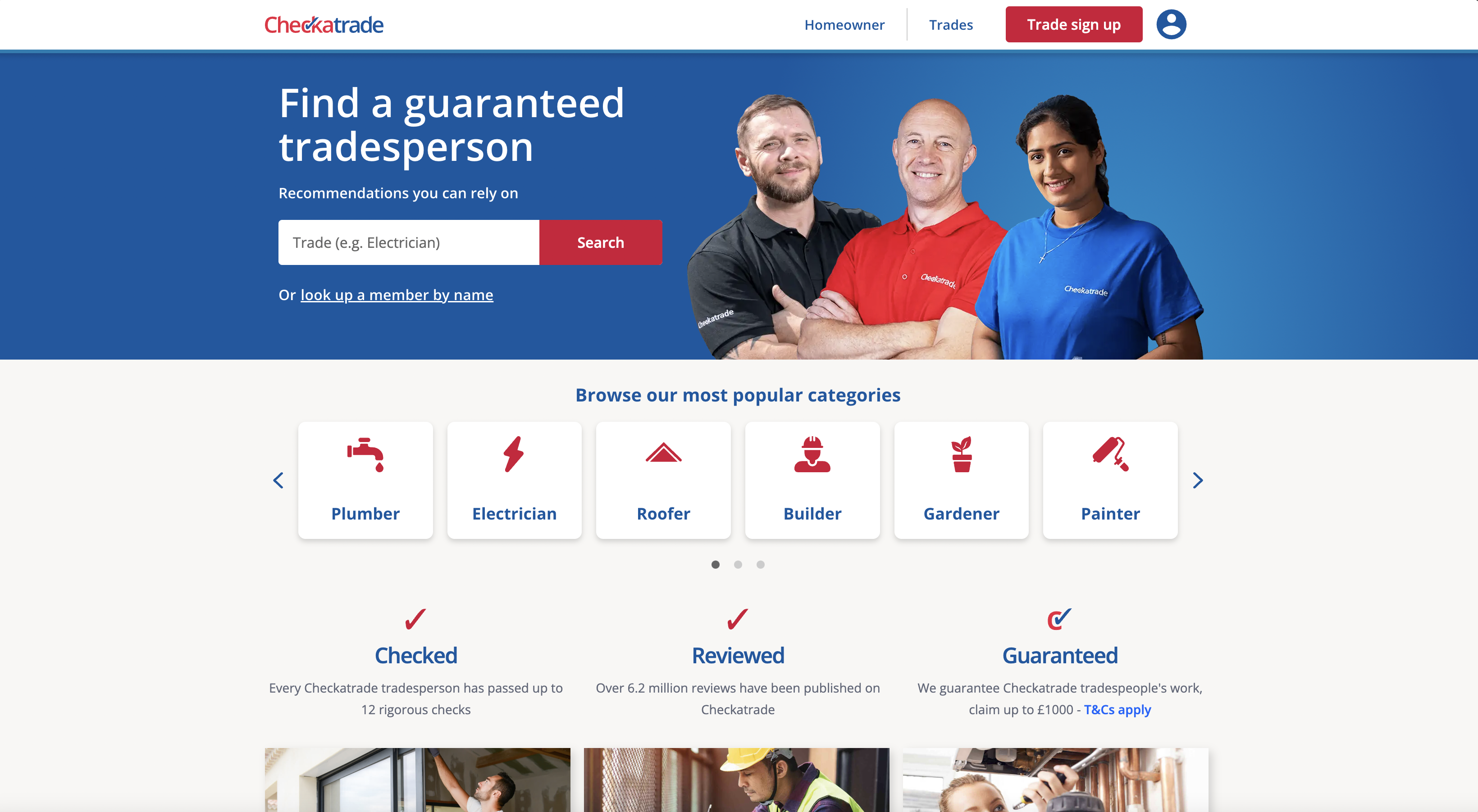
Day Out With The Kids, the UK’s biggest website for finding things to do with kids
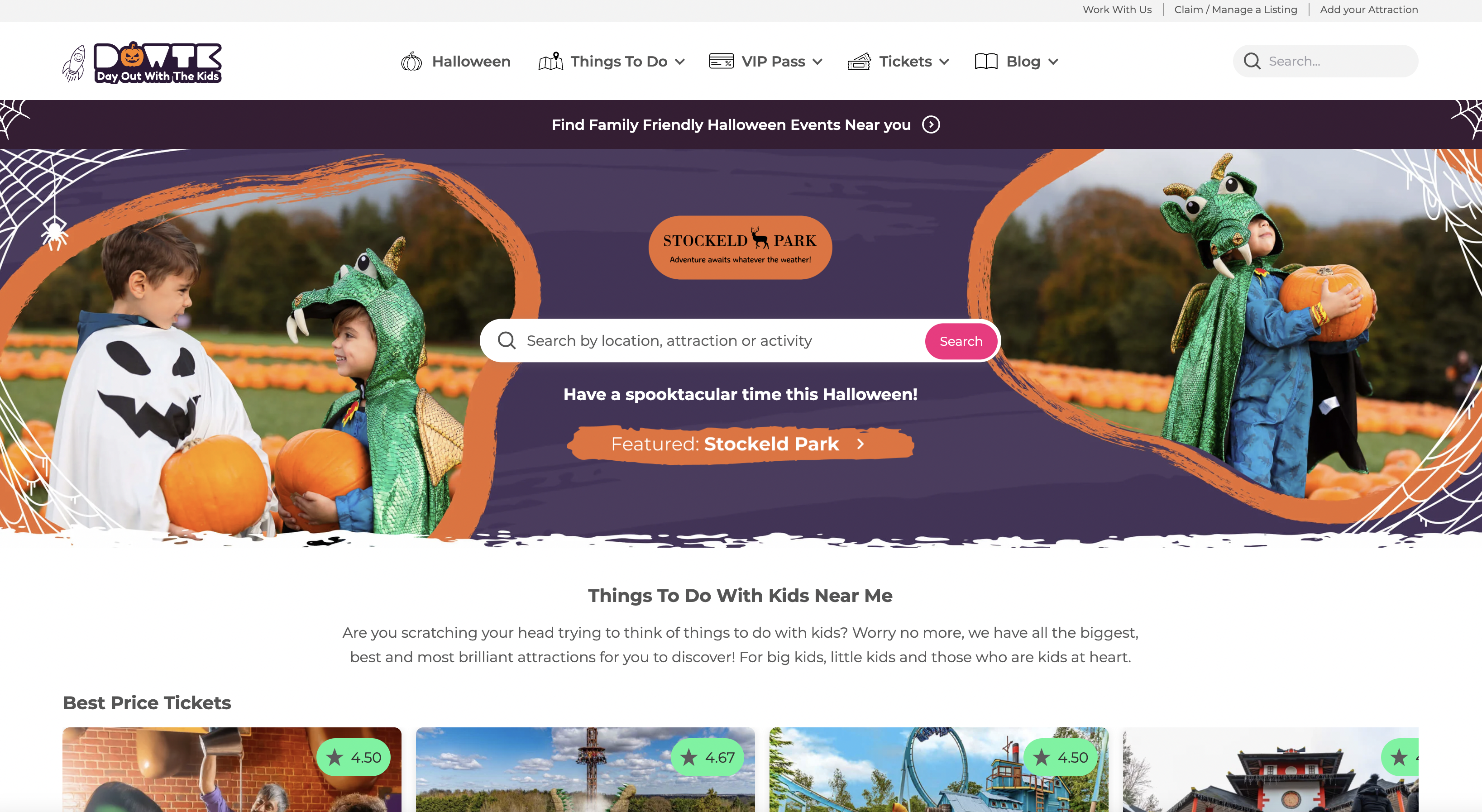
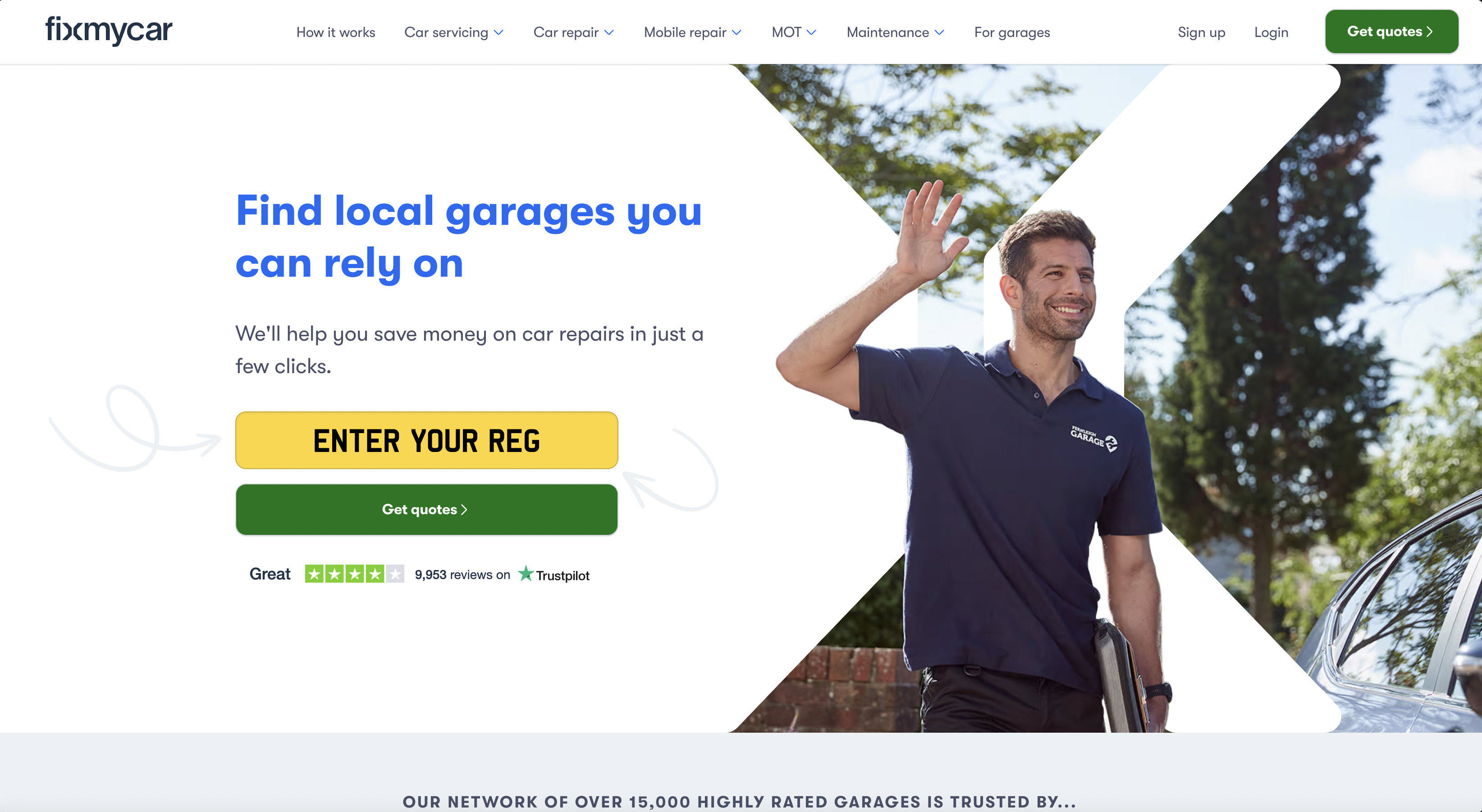
Ranking for ‘Near Me’ Searches: A Step-by-Step Guide
So you want to rank for ‘near me’ searches?
The tactics to deploy are very different, depending on the type of business you operate.
I’ll break down these tactics into three groups, based on the business types I gave examples of above. There’s some crossover, of course there is, but I’ll make it clear which tactics work for which type.
Here goes…
Ranking a Local Business for ‘Near Me’ Queries
You might already have figured it out, but ranking a local business for ‘near me’ queries is often harder than you’d expect it to be. Especially if you operate in an industry where ‘listings sites’ are popular.
You saw the SERPs for ‘near me’ searches for ‘plumbers’ and ‘things to do with kids’ earlier, and how not a single local business ranked in the top 10 results for these.
But that doesn’t mean local businesses can’t or don’t rank for these types of queries on the web results.
If I search for ‘vets near me’ (from Morecambe), I get the following results:
| Rank | URL | Site Type |
|---|---|---|
| 1 | https://www.vets4pets.com/find-a-practice/ | A Business That Serves Multiple Locations |
| 2 | https://www.btvets.co.uk/ | A Local Business |
| 3 | https://www.rspca.org.uk/adviceandwelfare/pets/findavet | A Listings Site |
| 4 | https://www.myfamilyvets.co.uk/find-a-vet | A Listings Site |
| 5 | https://vethelpdirect.com/find-a-vet/ | A Listings Site |
| 6 | https://www.vets4pets.com/practices/vets4pets-lancaster/ | A Business That Serves Multiple Locations |
| 7 | https://www.lancastervets.co.uk/ | A Local Business |
| 8 | https://www.carnforthpetcare.com/ | A Local Business |
| 9 | https://www.myfamilyvets.co.uk/Practices/Burch-Tree-Vets-Morecambe | A Listings Site |
| 10 | https://www.animaltrust.org.uk/find-a-surgery | A Business That Serves Multiple Locations |
Three of the top ten results (plus the map pack) are local businesses. Interestingly, two of these rank in the bottom half of the SERP.
Another?
Here’s the SERP when I search “solicitor near me”:
| Rank | URL | Site Type |
|---|---|---|
| 1 | https://www.ratcliffe-bibby.co.uk/ | A Local Business |
| 2 | https://solicitors.lawsociety.org.uk/ | A Listings Site |
| 3 | https://www.reviewsolicitors.co.uk/top/lancaster-morecambe | A Listings Site |
| 4 | https://www.samconveyancing.co.uk/Conveyancing-Solicitors/conveyancing-solicitors-morecambe | A Business That Serves Multiple Locations |
| 5 | https://inghams-law.co.uk/ | A Local Business |
| 6 | https://www.solicitorsnearme.com/ | A Listings Site |
| 7 | https://www.lawsociety.org.uk/en/public/for-public-visitors/find-a-solicitor | A Listings Site |
| 8 | https://www.bark.com/en/gb/lawyer/ | A Listings Site |
| 9 | https://lawhive.co.uk/solicitors-near-me/ | A Listings Site |
| 10 | https://find-legal-advice.justice.gov.uk/ | A Listings Site |
Ok, so being legal, the site type definitions get a bit blurry, but the same groupings apply.
Here, we see just two of the top ten results as local businesses. We do see the #1 result being a local business, though.
It’s not impossible to rank amongst the standard web results for these terms, but Google is clearly giving preference to ‘listings sites’ for ‘near me’ searches; likely due to the fact they offer a choice to searches, as I suggested above.
Your best bet is to take a few minutes to look at the SERPs for ‘near me’ queries in your location. You shouldn’t need to set your location on Google, but if you want to switch it out to a different area, check out this guide. Look at the type of business ranking and use these insights to inform your own strategy.
If you’re a local business, though, how can you leverage ‘near me’ searches as part of your strategy?
Deploy Local SEO Tactics to Optimise for your Local Area
Whilst it’s not guaranteed that a local business is going to rank at the top of the SERPs on the standard web results for ‘near me’ queries, especially where there’s tough competition from listings site and multi-region businesses, that doesn’t mean you should overlook the fundamentals that help you rank for traditional localised keywords.
In other words, make sure you’re getting the local SEO basics right.
That means:
- Optimised title tags, meta descriptions & H1 tags that clearly include your main location(s). For example, if you’re a plumber in Manchester, you’re going to want your homepage’s title tag to be something like <title>Trusted Local Plumbers in Manchester – [Company Name]</title>.
- Optimised page content that clearly targets your main location(s). This can be broken down into different location pages if relevant. Make sure you’re breaking down your key service offerings onto their own pages and optimising them accordingly.
- Your address and phone number are clearly listed on the site.
- Building citations that reference your NAP (Name, Address, Phone Number).
- Using LocalBusiness Schema / Structured Data
- Earning locally relevant links
Take a look at these local SEO guides by Backlinko, Semrush, and Ahrefs for more guidance on getting the basics right.
Optimise your Google Business Profile Listing to Rank on the Map Pack
Local businesses can’t afford to ignore the value of ranking amongst the map pack.
They’re usually visible right at the top of the SERPs for ‘near me’ queries, and especially on mobile, let searchers see a business’ location, get directions and click to call, as well as onto their website. Reviews, pricing and other information can also be seen here.
Even those ‘near me’ queries that don’t return any local businesses amongst the standard web results show (usually) 3 map results right at the top of the SERPs.
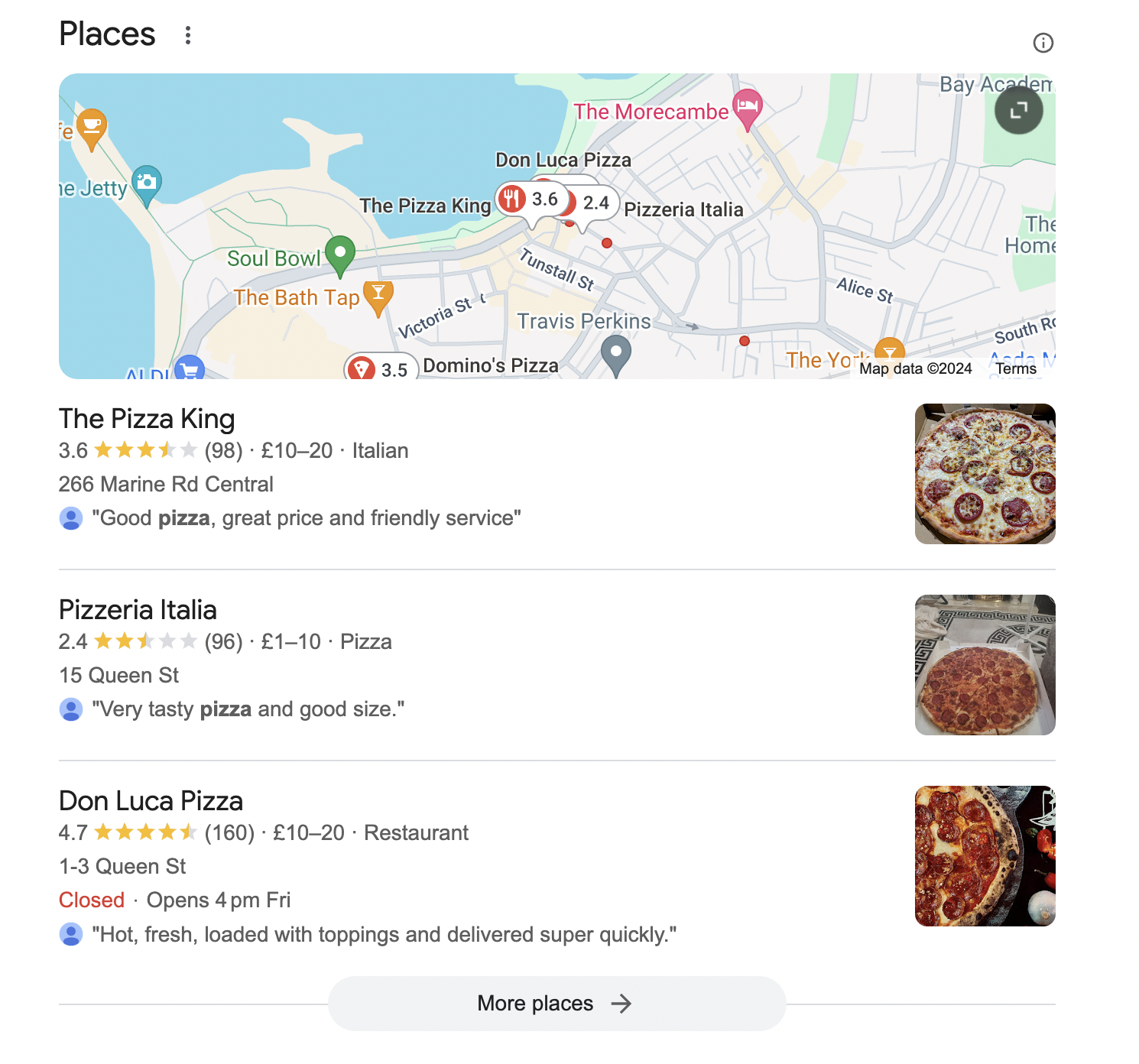
Every local business needs to create and optimise their Google Business Profile.
But once you’ve created, claimed and verified it, how do you go about making sure you rank at the top of the map pack for ‘near me’ queries?
- Add as much information as possible to your listing.
- Make sure you’re using a local phone number.
- Add your opening hours and keep these up to date.
- Write an optimised description that includes your main keywords.
- Choose the most relevant primary category to your business. Look at what competitors use if unsure. Add secondary categories if relevant.
- Add photos to your listing.
- Get reviews on your Google Business Profile and make sure you respond to these.
- Publish posts to your profile.
- Build citations that use consistent NAP.
- Earn locally relevant links and press coverage.
In fact, Google confirms that “local results are based primarily on relevance, distance and prominence.”
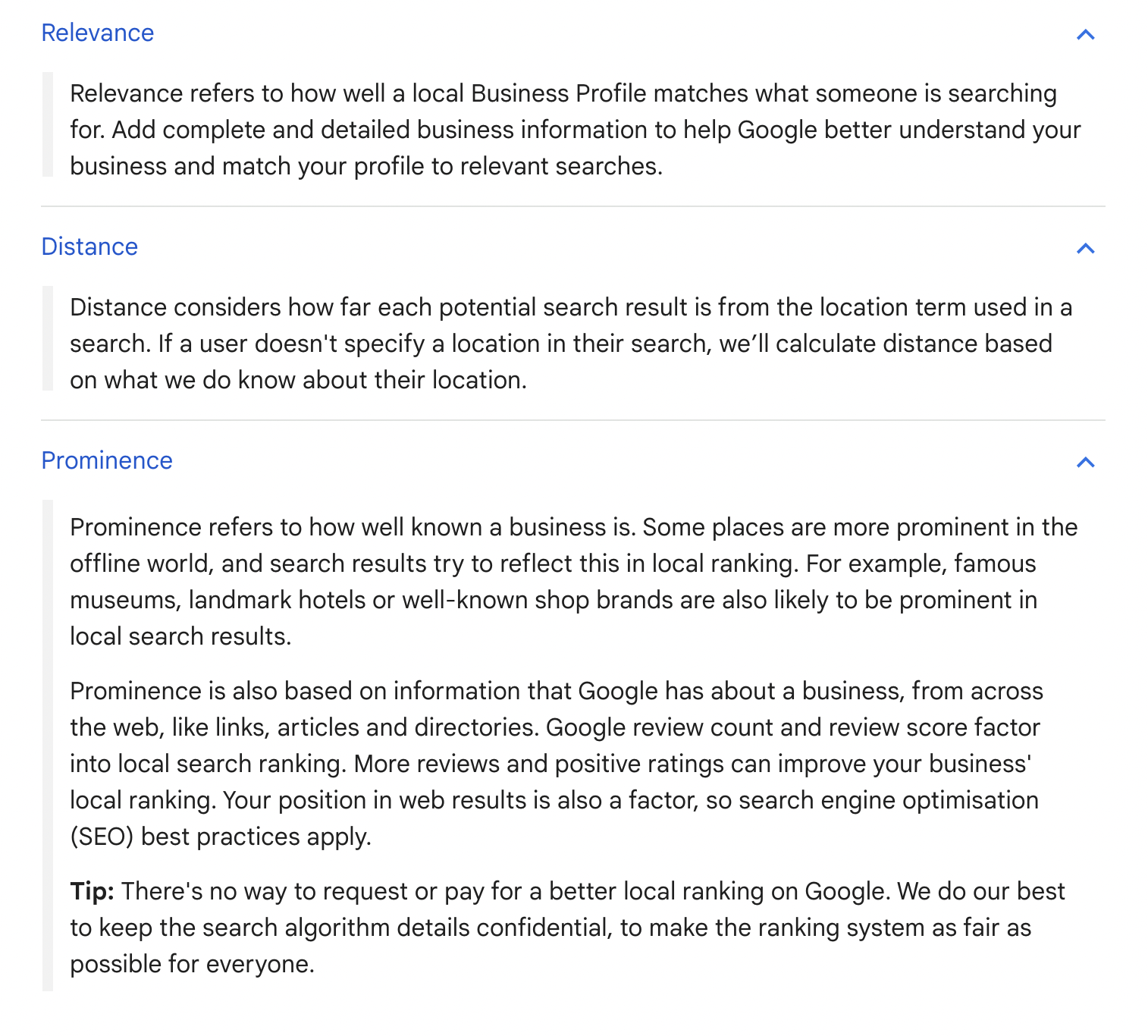
Relevance and prominence, in many ways, are the things you can actively control and optimise for. Distance, on the other hand, isn’t always as easy – you’re based where you’re based – but is key for ‘near me’ searches. After all, someone looking for a service or business near to them is likely considering the proximity to where they are.
Ranking on the map pack is a local business’ best chance of gaining strong visibility for ‘near me’ searches.
Get Yourself Listed on Listings Sites with Strong Visibility
Don’t fall into the trap of assuming an SEO’s job is only to optimise a business’s own website. Do this, and you’ll miss out on opportunities, especially to leverage ‘near me’ searches.
Those listing sites that we see ranking more than not for these type of queries?
Get yourself featured on them. Ideally, at the top of the listings.
To succeed at SEO in 2024, you need to understand the SERPs and where you can, and can’t, compete. As well as how you can maximise your visibility.
I’m absolutely not saying don’t optimise your site for local queries. You should be. But you need to remember that the majority of these results aren’t local businesses; they’re listing sites and multi-location businesses. Only a handful of local businesses usually show up for ‘near me’ searches, if at all sometimes.
But there’s a unique opportunity here in getting yourself featured on the listing sites.
By doing this, you’ll be able to have visibility across multiple page one listings on the SERPs. This means more people seeing your business and more potential leads, sales or visits. And the ‘trust’ that comes with being featured on some of these top-name listing sites.
In some cases, searchers actually trust the sites featured at the top of listings sites more than if they’d clicked straight onto that business’s website.
Yes, getting listed (at least at the top of the results) on these pages costs money. Often a monthly or yearly subscription. But it’s often worth it for the visibility.
You’ll usually find a ‘join’ or ‘sign up’ option on the site.
Take for example MyBuilder.com…
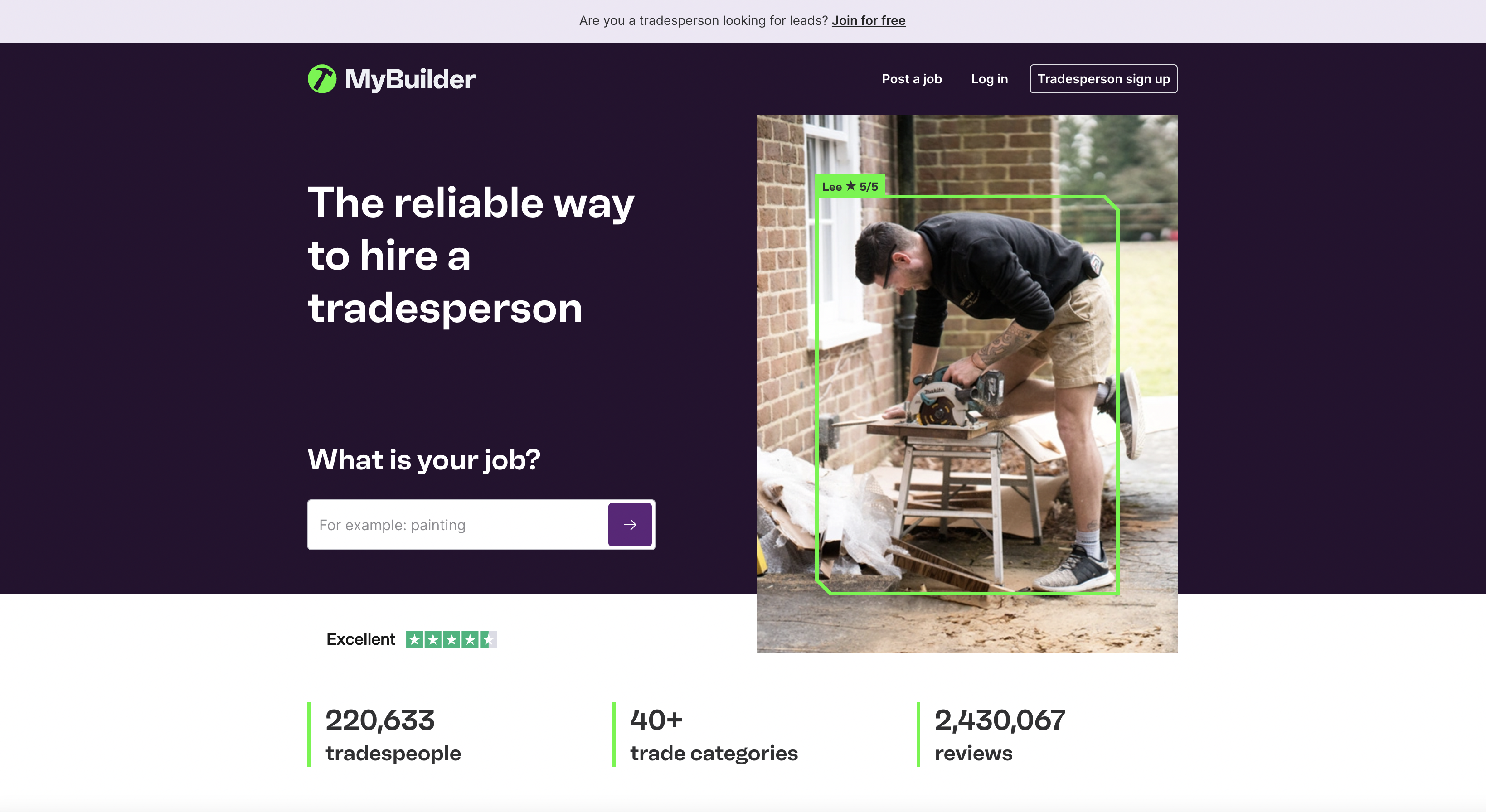
See that top banner? A link to ‘Join for free.’
Another example?
ReviewSolicitors offers both free and premium options, with the latter starting from £150 p/m.
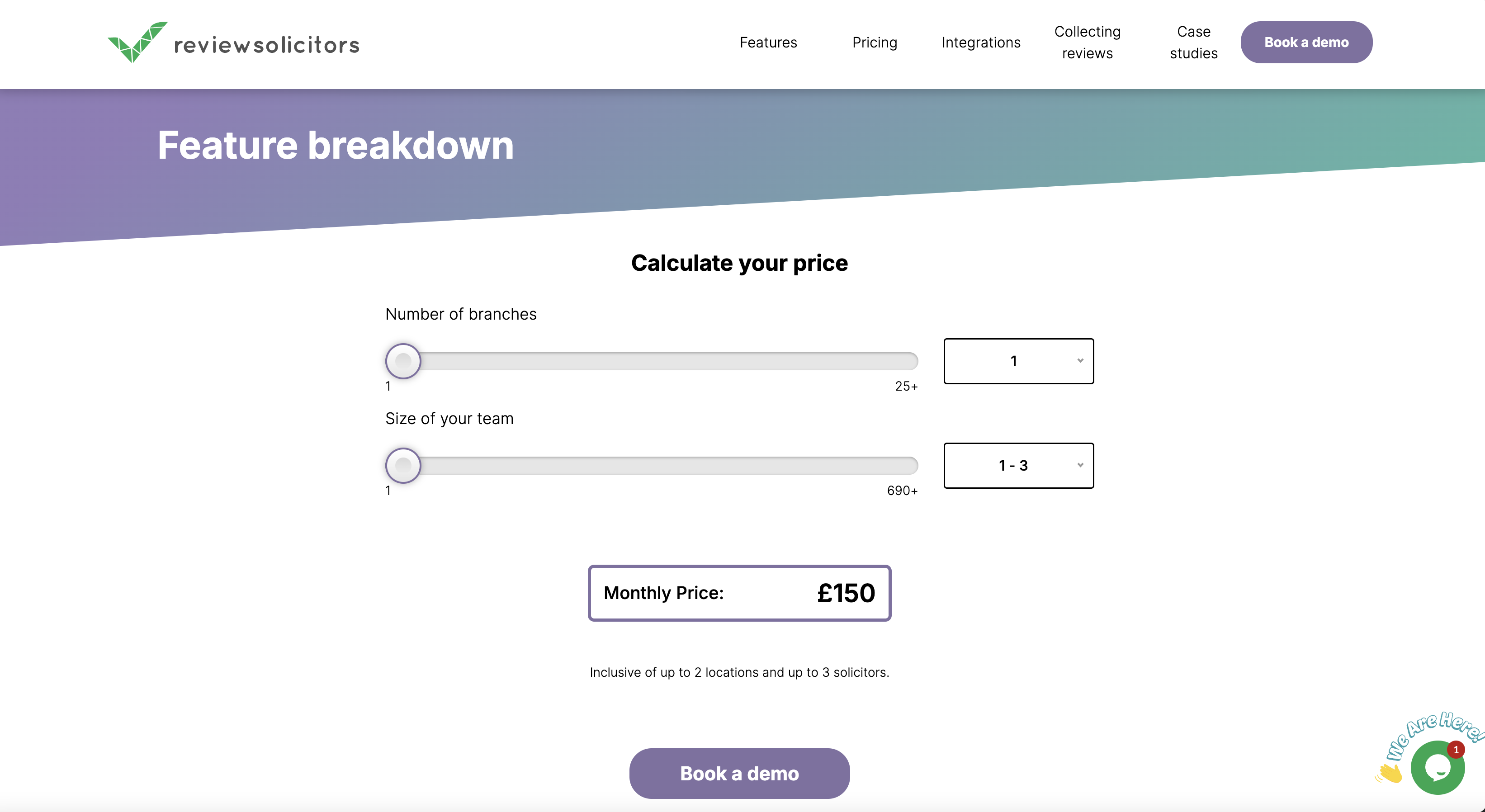
Another one in the legal space, Lawhive, on the other hand, is free to join, with a fee share structure in place. You’ve nothing to lose signing up in cases like this.

SEO in 2024 isn’t just about ranking your own site, and if you’re running a local business, grabbing space on these types of listing sites can be invaluable.
But how do you know which ones to sign up to and which not to bother with?
Search Google for your target ‘near me’ queries.
If a listing site ranks, consider getting featured.
Another quick tip to determine how much visibility you’ll get is to drop the URL of a listings page into Semrush or Ahrefs and see the estimated monthly traffic (for that page).
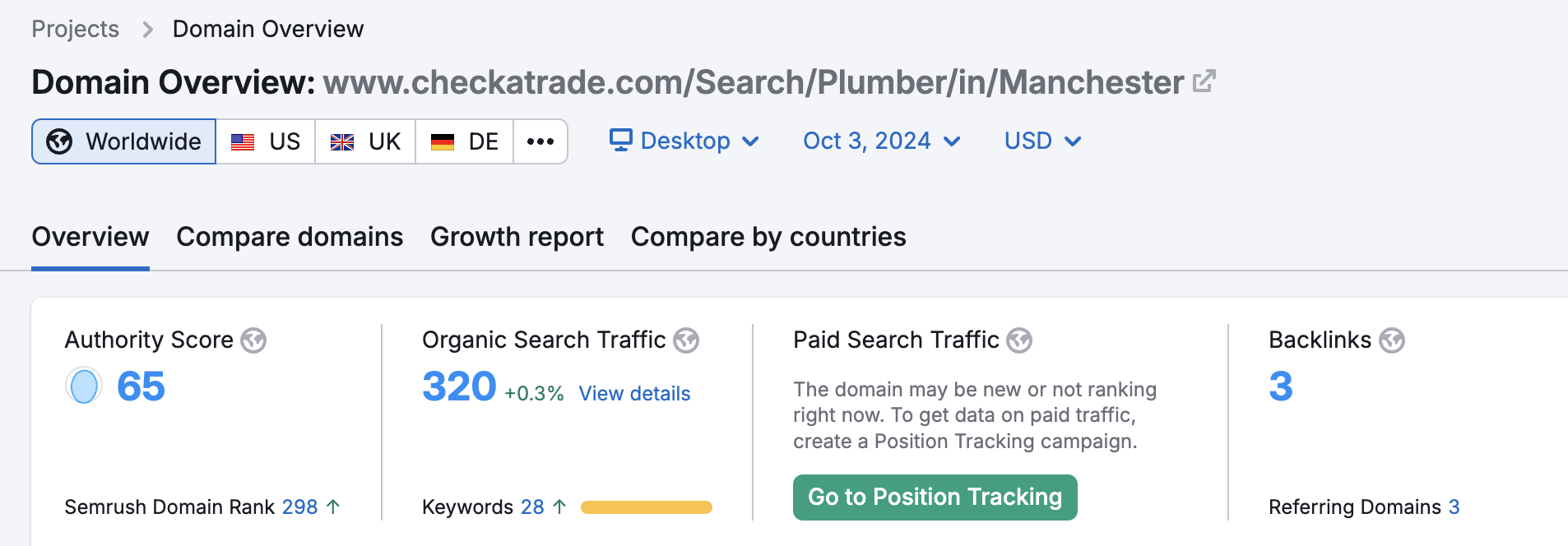
Ranking a Business that Serves Multiple Locations for ‘Near Me’ Queries
If you run or are working for a business that serves multiple locations, you’ve got a pretty easy opportunity to earn visibility across ‘near me’ searches.
Here’s how…
Build Location Pages for Each Area You Service
Make sure you have location pages for every area you do business in.
And whilst that might mean having a page for each of your physical locations, this isn’t always the case.
If you have got multiple stores or service locations, you’ll want to build out optimised pages for each, making sure to focus on:
- Optimised title tags, meta descriptions & H1 tags that clearly include your main location(s). For example, if you’re a chain of dentists, you’re going to want each location’s title tag to be something like <title>NHS & Private Dentist in Manchester – [Company Name]</title>.
- Optimised page content that clearly targets the location.
- The address and phone number of the location clearly listed on the site.
- Building citations that reference your NAP (Name, Address, Phone Number) for each location.
- Using LocalBusiness Schema / Structured Data
- Earning locally relevant links
Think of it like we explained local SEO for a local business above, just at page-level and replicated across all your locations.
Here’s a good example:
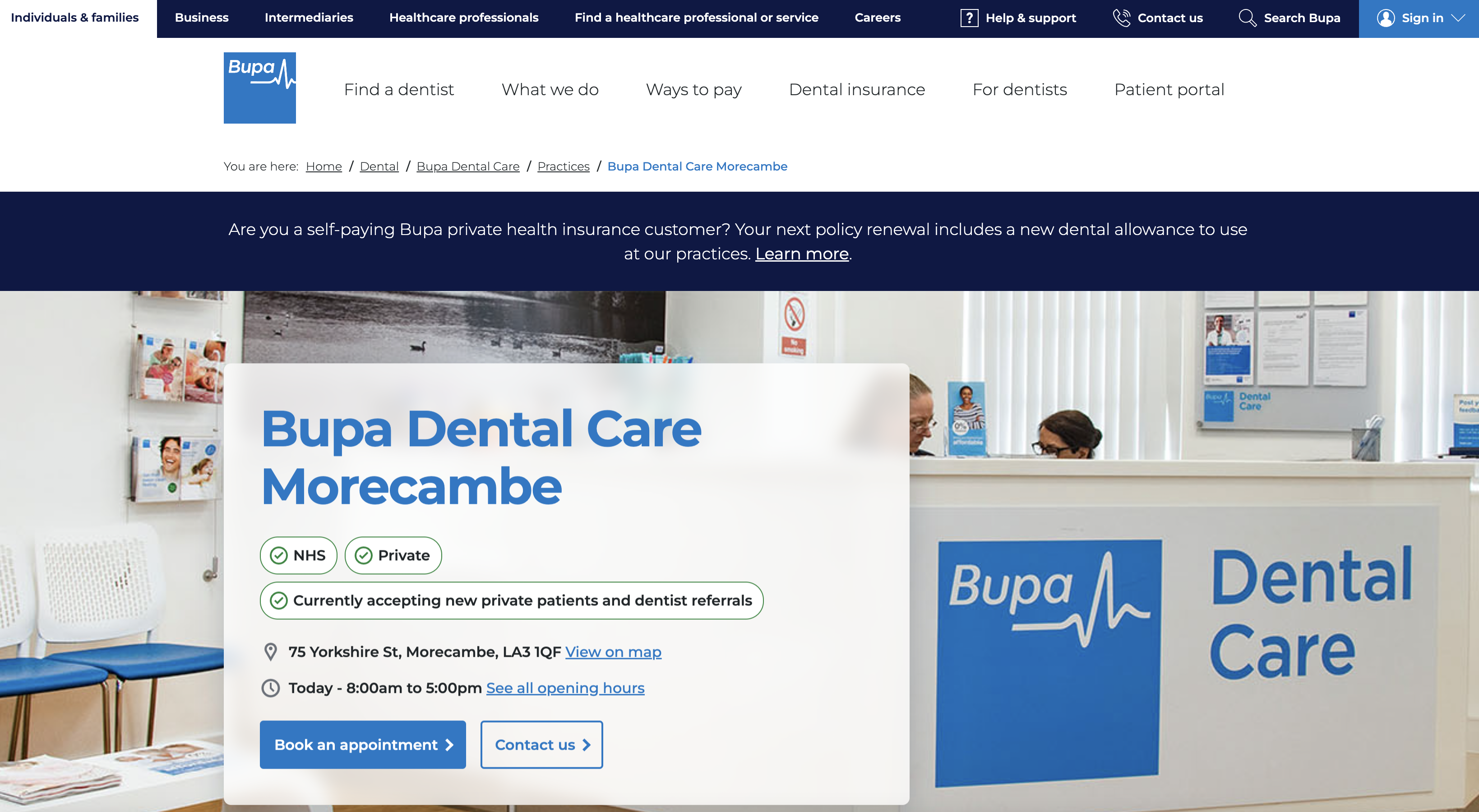
If you’re a nationwide business that offers services to customers or clients in their own area (at their own homes, let’s say), though, and don’t have physical stores or locations, you should still go ahead and build out these pages.
An example I’m working on right now?
Building out localised landing pages for BOXT:
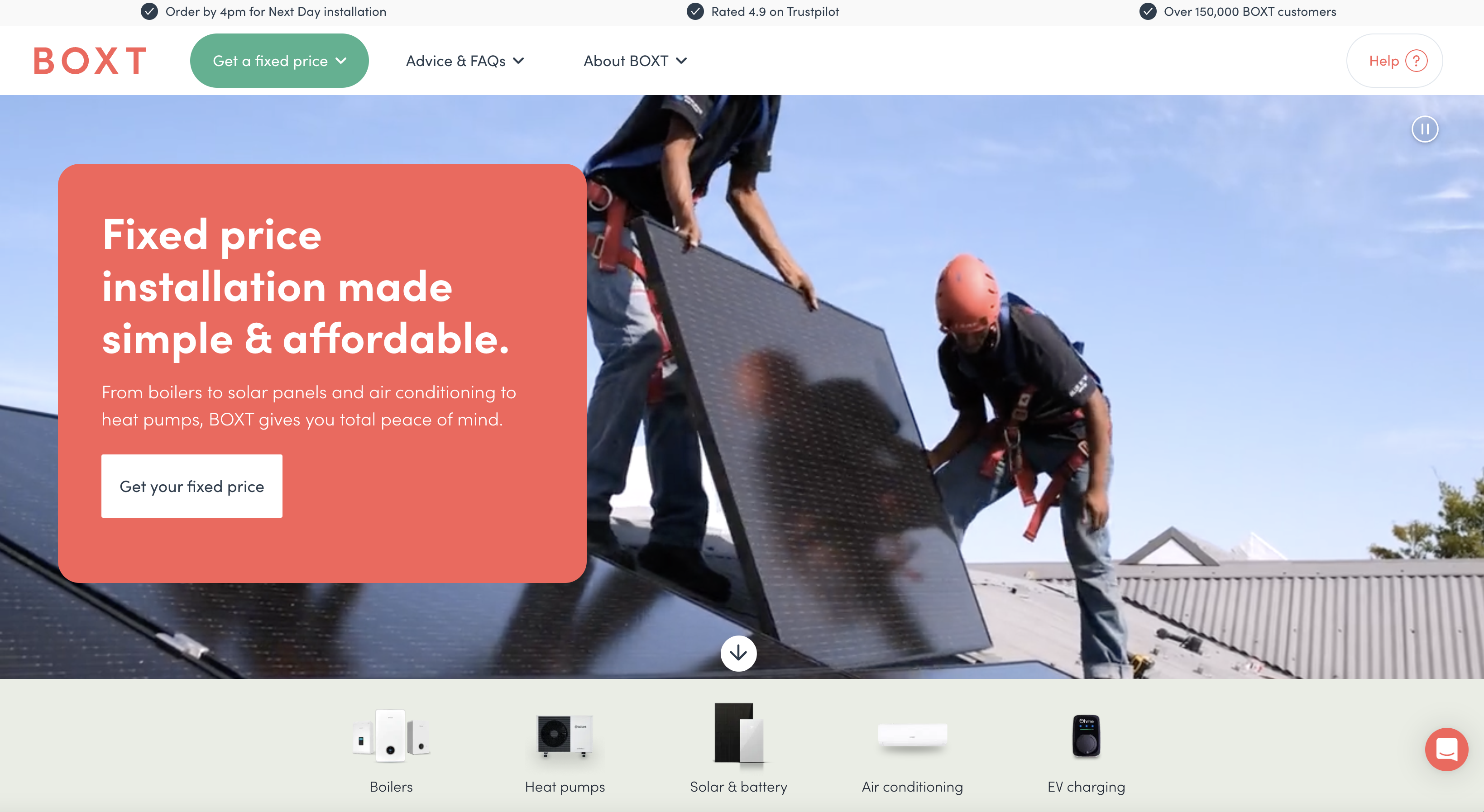
With a large nationwide network of boiler installation specialists, there’s a massive opportunity here to significantly expand localised visibility, including that for ‘near me’ queries.
Optimise your Google Business Profile Listing to Rank on the Map Pack
I won’t go through it again, but make sure you’ve got an optimised Google Business Profile page for each of your locations (if you’ve got physical stores or offices).
Think of these as lots of individual local businesses for ranking on the map pack, but with the URL being the location page on your site.
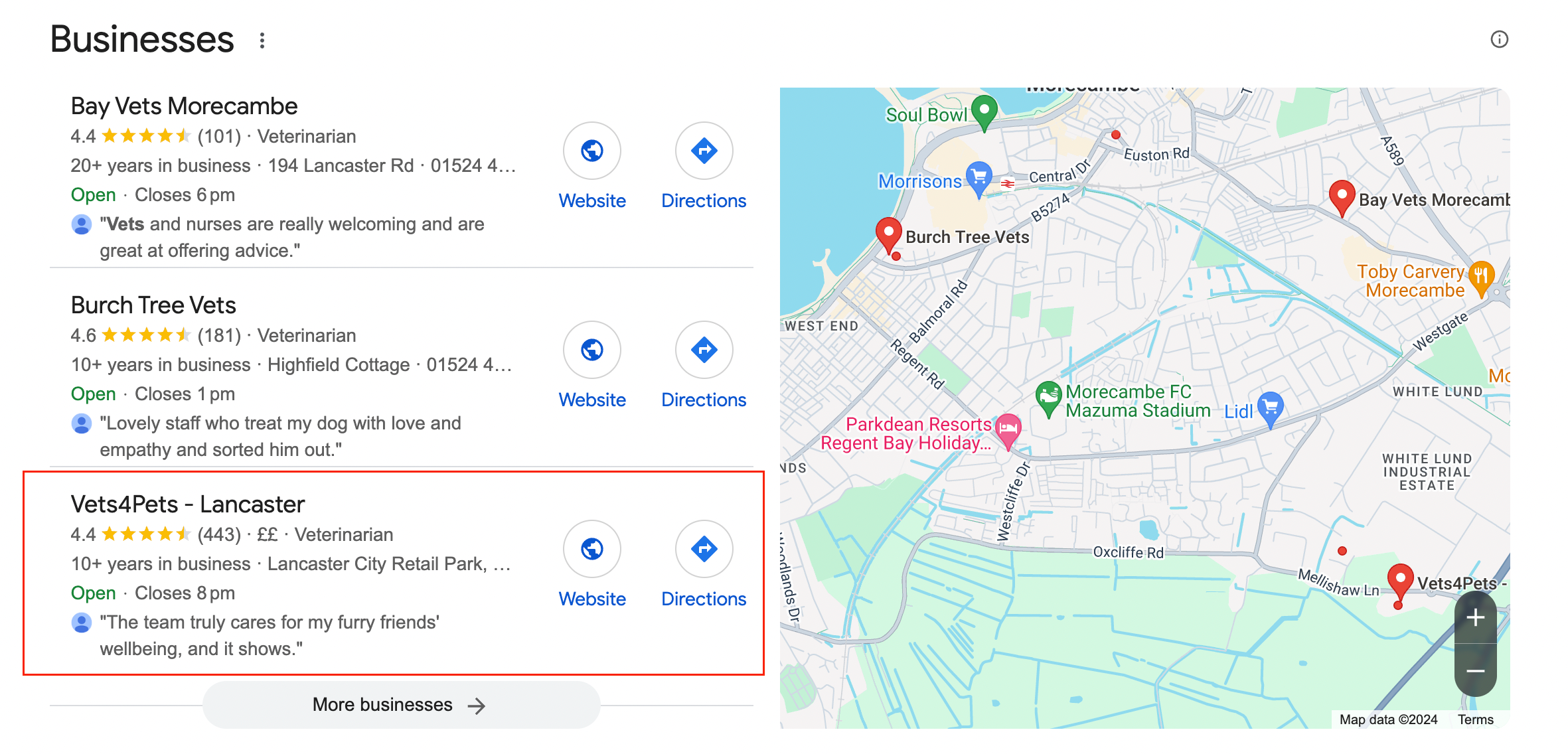
Get Yourself Listed on Listings Sites with Strong Visibility
Want to REALLY own each location’s SERPs?
Read back through the suggested approach for getting featured on listings sites and get each of your physical locations featured. Or at least the ones where it makes the most sense for your business.
In fact, businesses with multiple locations probably have the best opportunities out of all of these types to rank for ‘near me’ searches, given they’re usually able to secure visibility across the map pack, standard web results AND on listings pages.
Ranking a Listings Site for ‘Near Me’ Queries
Whilst listings sites don’t have the ability to rank on the map pack or on other listings sites, they do have a massive advantage when it comes to ranking on the standard web results, as we’ve seen across the examples I’ve given.
And the route to go down to make this happen is probably one you’re already doing; having optimised listings pages for each location.
Want an example?
Here’s a solid one of Checkatrade’s ‘Plumbers in Lancaster’ page:

Just be sure to consider how granular you should go; in larger cities, for example, you’ll almost certainly want to break this down way more specifically than just the city itself.
You’ll need to do your own research into this to decide how to break locations down, but the more granular you’re able to get, the greater your chances of really owning those ‘near me’ queries.
‘Near Me’ Rankings: an Opportunity to Increase Your Site’s Local Visibility
So there we go. A detailed blueprint to help you rank for ‘near me’ queries.
It’s easy to assume that there’s not much to ranking for these terms, but once you dive into the makeup of the SERPs, you start to see that different types of businesses have different opportunities here.
Understand the SERPs and leverage these insights as part of your strategy.
Need help launching a ‘near me’ strategy for your business? Get in touch, we’d love to chat…





